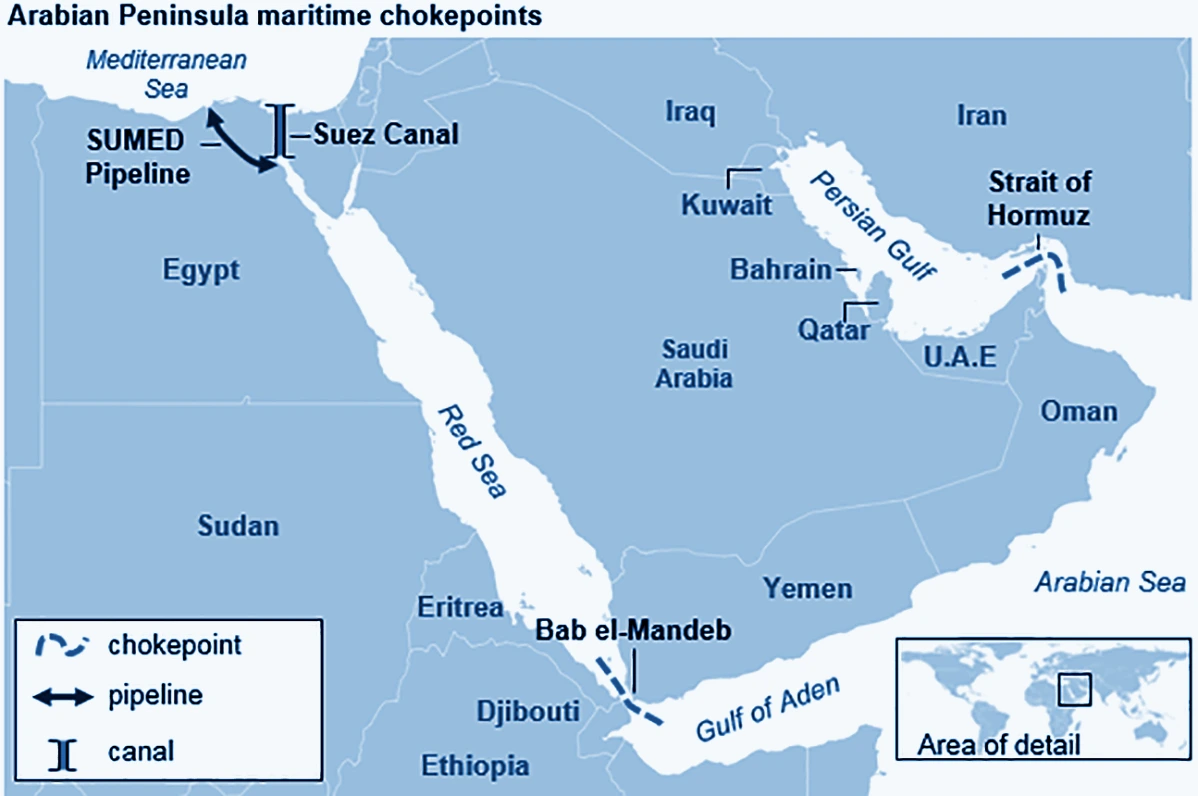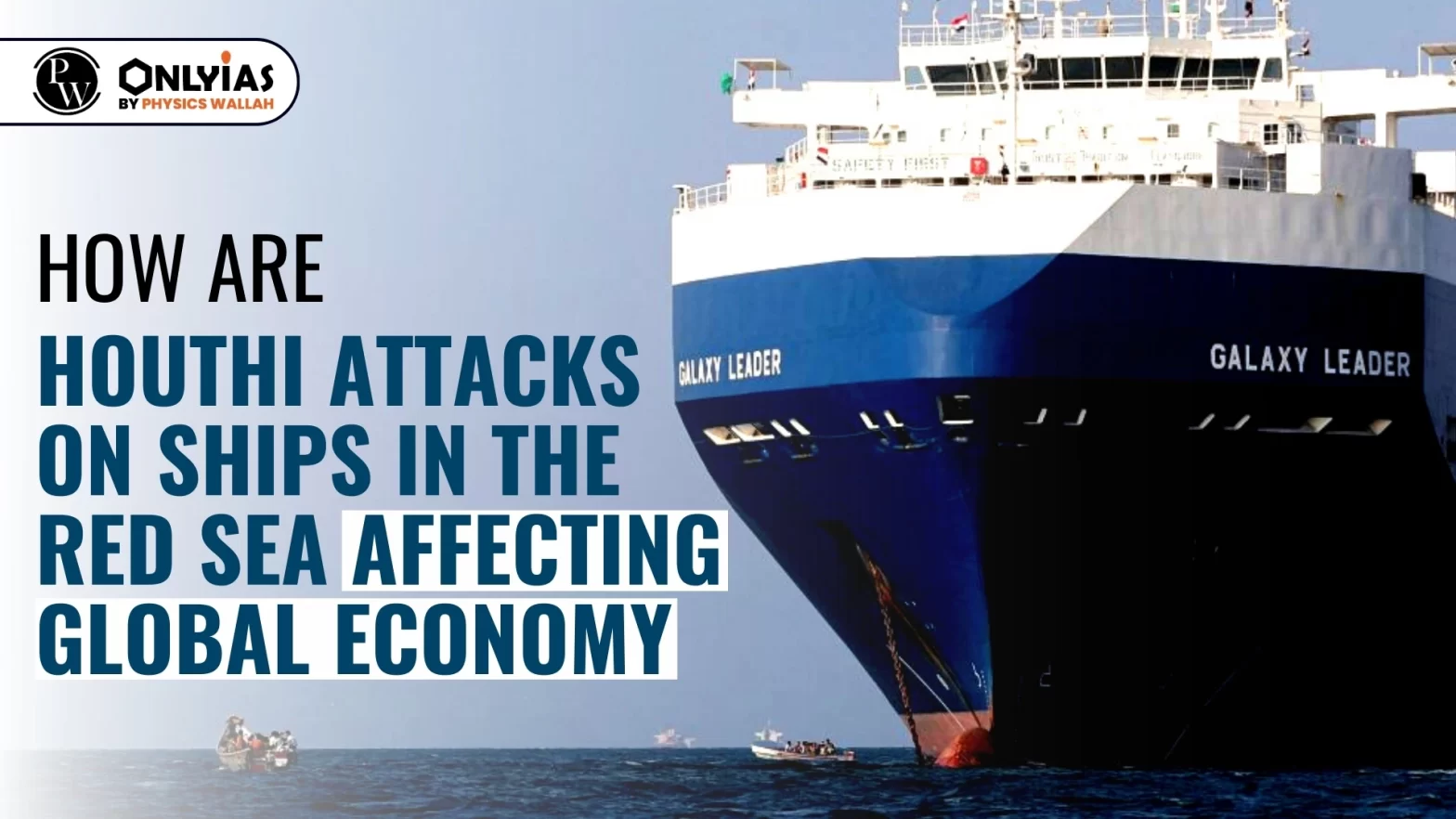Context: This article is based on an Editorial “A new Suez crisis threatens the world economy” which was published in the Hindu. Recently, a naval crisis is unfolding that could transform the war between Israel and Hamas into a global affair with implications for the world economy.
- Since December 15th four of the world’s largest container-shipping companies, CMA CGM, Hapag-Lloyd, Maersk, and MSC have suspended their services in the Red Sea, after attacks on commercial vessels by Yemen’s Iran-backed Houthi militants.
| Relevancy for Prelims: Location of the Red Sea and Bab el-Mandeb.
Relevancy for Mains: Significance of Naval Trade and its Security. |
Why are Houthis attacking ships in the Red Sea?
- To Support Hamas: The Houthis have declared their support for Hamas after Israel launched a military campaign in Gaza following the 7 October Hamas attacks.
- To Attack and Deteriorate Israel: Houthis are targeting ships traveling to Israel.
- Houthis have been stepping up their attacks, using drones and rockets against foreign-owned vessels.
- They have also been firing drones and missiles towards Israel.
About the Red Sea and Bab el-Mandeb
- Red Sea: A vital waterway for global commerce and energy shipped between Europe and Asia.
- Through the Red Sea, perhaps one-third of the global seaborne oil supply passes.
 Significance: An estimated 12% of global trade by volume normally flows, and perhaps 30% of global container traffic through it.
Significance: An estimated 12% of global trade by volume normally flows, and perhaps 30% of global container traffic through it. - Challenge: It has become a no-go zone as the Houthis attack shipping.
- Bab el-Mandeb: It is a narrow strait between Africa and the Arabian Peninsula.
- It is located between Yemen on the Arabian Peninsula and Djibouti and Eritrea on the African coast.
- It is also known as the Gate of Tears.
- Significance: It is the route by which ships can reach the Suez Canal from the south – itself a major shipping lane.
- Avoiding it means vessels must take much longer routes, for example navigating around southern Africa.
Houthi Attacks on Ships in Red Sea; Impacts
- Risks of military escalation in the Middle East: As Western countries try to re-establish order.
- As one of the world’s major trade arteries suddenly closes, America and its allies are ramping up naval activity in the Middle East, and may even attack the Houthis, in order to re-establish free passage.
- Impact on Egypt: Revenue from the Suez Canal is a major source of income for Egypt, which is already in the midst of a financial crisis. Israel will be less affected, with only about 5% of its trade passing through Eilat, its Red Sea port.
- Economic Impacts: A prolonged closure of the Suez route would raise the costs of trade as shipping is rerouted around Africa, taking more time, and insurance premiums soar.
- Short-term Supply-chain Threats: It could also result from wide-scale rerouting of trade.
- Example: In 2021 the Ever Given, a Taiwanese-operated ship, ran aground and blocked the canal for six days, amplifying a global supply-chain crunch.
Conclusion:
Such an attack is going to impact on the World’s economy and its costs are likely to be passed on to the consumers. It’s going to have serious implications on stock levels, on costs, and the whole dynamics of supply chains. If military support to each ship is provided, then it would also raise the costs on a very high scale.
![]() 18 Dec 2023
18 Dec 2023

 Significance: An estimated 12% of global trade by volume normally flows, and perhaps 30% of global container traffic through it.
Significance: An estimated 12% of global trade by volume normally flows, and perhaps 30% of global container traffic through it. 